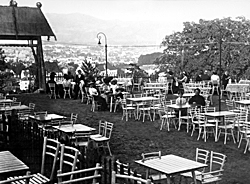Everday life

The social problems conjured up by industrialisation remained unsolved for the most part. Technical development demanded higher levels of qualification on the one hand, while mechanisation required a greater number of unskilled workers on the other. Factory work demanded stronger social discipline in regard to punctuality. Working hours and pay in industry varied strongly depending on the industrial sector.
But in addition to work, free time and holidays were also part of everyday life. Since the Biedermeier period „promenading“, and, as a result, the outing gained in importance as a way of using free time. Coffee houses and guest houses were favourite meeting places, gymnastics and sporting activities also became more important towards the end of the 19th century. Numerous music and choral societies played an major role in the city's social life.
Daily life of the working classes was marked by permanent plight in terms of housing. An average of 4.85 inhabitants per apartment meant a significantly higher population density in parts of the city than in, say, Graz or Salzburg. Around 1900, the majority of flats housed between three and five people. A toilet, bathroom or even a kitchen were rarities.